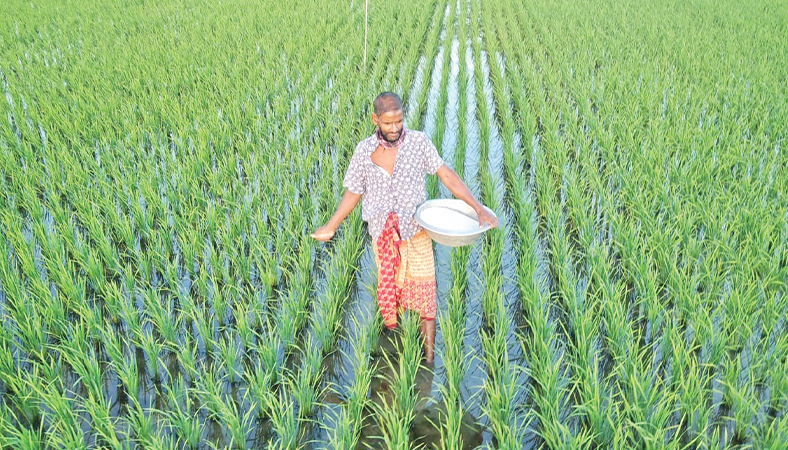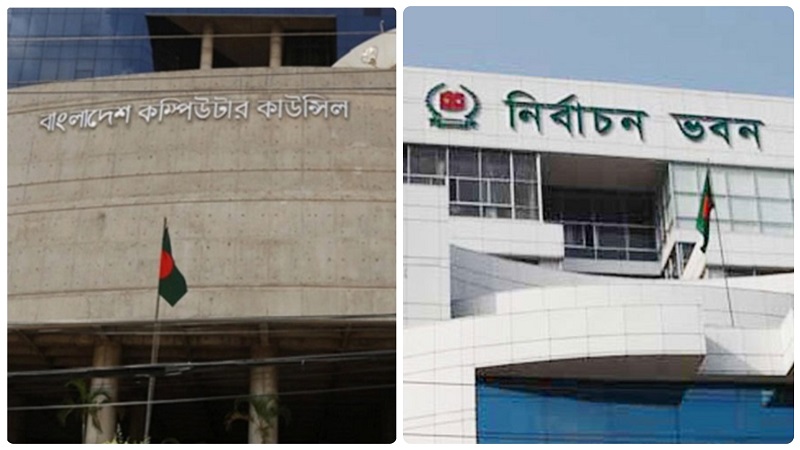Farmers in several districts are suffering from an acute shortage of muriate of potash (MOP) fertiliser at the beginning of the Aman season, despite having above two lakh tonnes of fertiliser in stock.
According to the sources, the Bangladesh Agricultural Development Corporation (BADC) has above two lakh tonnes of MOP in its stock while the data of the Department of Agricultural Extension (DAE) has 17,165 tonnes of MOP stock.
Nagad
Fertiliser dealers and agriculture officers claim that they are not getting a sufficient supply of the MOP from BADC which created the supply shortage of the fertiliser in the market. Farmers are being forced to sow Aman without fertiliser.
Azgar Ali, district agriculture officer of Jhenaidah, said, “We have a target to cultivate Aman on 1.04 lakh hectors of land in this season and above 80 per cent sowing has been completed, but the farmers are planting the paddy without fertiliser.”
Farmers are facing problems to buy MOP at different places in Madaripur, said district agriculture officer Md Moazzem Hossain.
Shortage of MOP has also been reported from Jashore, Faridpur and some other districts of the country, according to our correspondents.
Md Jahangir Hossain, president of Bangladesh Fertiliser Association, Jhenaidah, told The Business Post that they are facing a shortage in supply of fertiliser and it is becoming difficult for them to manage farmers with low supply.
“The supply of 25 per cent of allocated fertiliser for July is still due. Moreover, the suppliers so far have not supplied any manure allocated for August. The authorities are supplying one or two trucks of fertiliser every day to distribute among the dealers which is much lower than the demand,” he said, adding “Suppose, our demand is 20 tonnes, but we have received two tonnes. How are we supposed to manage?”
“In the district, there are 93 fertiliser dealers. Dealers of neighbouring districts are also facing MOP shortage,” Jahangir added.
The supply shortage came at a time when Aman cultivation has already started and Robi harvesting is nearing its end. Farmers are worried if they would be able to apply fertiliser on time. Already incurring huge losses due to the recent flood and drought during the Robi season, they are apprehending a fall in crop production in Aman season also.
Elahi Mollah, a farmer from Shailkupa upajila, said, “Dealers are saying there is no supply of potash. I failed to buy potash, which is very important for Aman cultivation, from the market. Without potash, the paddies will not grow enough and the yield will be less.”
Meanwhile, the BADC sources blamed the increased transportation cost due to the recent fuel price hike as a reason behind the fall in supply.
“The country has around two lakh tonnes of MOP stock which is enough for Aman season, but due to increased cost of transportation and distribution, many dealers are not getting the fertiliser in time,” a BADC official told The Business Post on condition of anonymity.
He claimed that due to fuel price hikes, transport vendors are delaying delivery of the supply.
However, Sheikh Mohammad Saiful Islam, manager (transportation) of BADC claimed that he did not have any information about fertiliser shortage.
“As I know, everything is going well and we are providing fertiliser to the dealers as per their requirement,” Saiful told The Business Post.
On the other hand, the Bangladesh Fertiliser Association, the apex body of fertiliser importers and dealers in the private sector received information on fertiliser shortages from many districts.
Bangladesh Fertiliser Association Executive Secretary Riaz Uddin Ahmed told The Business Post, “As I know, Bangladesh has enough stock of MOP. Around 90,000 more tonnes of fertiliser will be released from the port at the end of August. However, dealers from many districts informed us that there is a supply shortage of MOP which is very important for Aman cultivation.”
BADC Chairman AFM Hayatullah, however, is not well aware of the present situation. “Fertiliser is a very sensitive issue. I cannot make any comment without knowing the issue properly,” he said.
According to the United States Department of Agriculture (USDA), Bangladesh consumes approximately six million tonnes of chemical fertilisers annually.
The most common chemical fertilisers are urea, triple super phosphate (TSP), diammonium phosphate (DAP), muriate of potash (MOP), gypsum, zinc sulphate, ammonium sulphate, and magnesium sulphate.
Bangladesh is fully dependent on imports for MOP and the maximum portion comes from Russia and Belarus. Canada is also one of the biggest MOP suppliers for Bangladesh. In FY22, the country imported around 9.03 lakh tonnes of MOP. During the tenure, the country consumed around 8.32 lakh tonnes of MOP, according to the USDA.
However, Bangladesh started FY23 with 3.04 lakh tonnes of reserved MOP.
According to sources, although the local fertiliser market is controlled by the government providing subsidies, a large portion of the manure is imported by the private sector. Generally, the government starts floating tender to import fertiliser every June, and the whole import payment is paid by the government.
The government completed the procedure of the tender on 9 June and seven private importers got permission to import 2.5 lakh tonnes of MOP. The rest of the demand is supposed to be met by BADC through the direct import method.
Private importers said in previous years, they used to import the majority of MOP from Russia and Belarus. But, as the Black Sea route is blocked this year due to the Russia-Ukraine war, they have imported fertiliser from Canada and Jordan.
Meanwhile, the price of fertiliser has increased to above $1,000 from $600 due to the recent global economic crisis.













